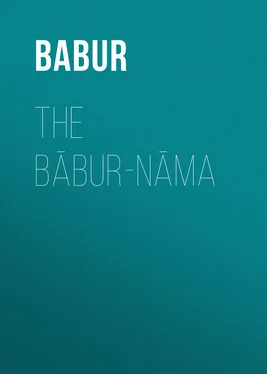Babur - The Bābur-nāma
Здесь есть возможность читать онлайн «Babur - The Bābur-nāma» — ознакомительный отрывок электронной книги совершенно бесплатно, а после прочтения отрывка купить полную версию. В некоторых случаях можно слушать аудио, скачать через торрент в формате fb2 и присутствует краткое содержание. Жанр: foreign_antique, foreign_prose, на английском языке. Описание произведения, (предисловие) а так же отзывы посетителей доступны на портале библиотеки ЛибКат.
- Название:The Bābur-nāma
- Автор:
- Жанр:
- Год:неизвестен
- ISBN:нет данных
- Рейтинг книги:4 / 5. Голосов: 1
-
Избранное:Добавить в избранное
- Отзывы:
-
Ваша оценка:
- 80
- 1
- 2
- 3
- 4
- 5
The Bābur-nāma: краткое содержание, описание и аннотация
Предлагаем к чтению аннотацию, описание, краткое содержание или предисловие (зависит от того, что написал сам автор книги «The Bābur-nāma»). Если вы не нашли необходимую информацию о книге — напишите в комментариях, мы постараемся отыскать её.
The Bābur-nāma — читать онлайн ознакомительный отрывок
Ниже представлен текст книги, разбитый по страницам. Система сохранения места последней прочитанной страницы, позволяет с удобством читать онлайн бесплатно книгу «The Bābur-nāma», без необходимости каждый раз заново искать на чём Вы остановились. Поставьте закладку, и сможете в любой момент перейти на страницу, на которой закончили чтение.
Интервал:
Закладка:
Sayyid Yūsuf, the Grey Wolfer 214was another; his grandfather will have come from the Mughūl horde; his father was favoured by Aūlūgh Beg Mīrzā ( Shāhrukhī ). His judgment and counsel were excellent; he had courage too. He played well on the guitar ( qūbuz ). He was with me when I first went to Kābul; I shewed him great favour and in truth he was worthy of favour. I left him in Kābul the first year the army rode out for Hindūstān; at that time he went to God’s mercy. 215
Darwesh Beg was another; he was of the line of Aīku-tīmūr Beg, 216a favourite of Tīmūr Beg. He was a disciple of his Highness Khwāja ‘Ubaidu’l-lāh ( Aḥrārī ), had knowledge of the science of music, played several instruments and was naturally disposed to poetry. He was drowned in the Chīr at the time of Sl. Aḥmad Mīrzā’s discomfiture.
Muḥammad Mazīd Tarkhān was another, a younger full-brother of Darwesh Muḥ. Tarkhān. He was Governor in Turkistān for some years till Shaibānī Khān took it from him. His judgment and counsel were excellent; he was an unscrupulous and vicious person. The second and third times I took Samarkand, he came to my presence and each time I shewed him very great favour. He died in the fight at Kūl-i-malik (918 AH. -1512 AD.).
Bāqī Tarkhān was another, the son of ‘Abdu’l-‘alī Tarkhān and Sl. Aḥmad Mīrzā’s aunt. When his father died, they gave him Bukhārā. He grew in greatness under Sl. ‘Alī Mīrzā, his retainers numbering 5 or 6,000. He was neither obedient nor very submissive to Sl. ‘Alī Mīrzā. He fought Shaibānī Khān at Dabūsī (905 AH.) and was crushed; by the help of this defeat, Shaibānī Khān went and took Bukhārā. He was very fond of hawking; they say he kept 700 birds. His manners and habits were not such as may be told; 217he grew up with a Mīrzā’s state and splendour. Because his father had shewn favour to Shaibānī Khān, he went to the Khān’s presence, but that inhuman ingrate made him no sort of return in favour and kindness. He left the world at Akhsī, in misery and wretchedness.
Sl. Ḥusain Arghūn was another. He was known as Qarā-kūlī because he had held the Qarā-kūl government for a time. His judgment and counsel were excellent; he was long in my presence also.
Qulī Muḥammad Būghdā 218was another, a qūchīn ; he must have been a brave man.
‘Abdu’l-karīm Ishrit 219was another; he was an Aūīghūr, Sl. Aḥmad Mīrzā’s Lord of the Gate, a brave and generous man.
( u. Historical narrative resumed. )
After Sl. Aḥmad Mīrzā’s death, his begs in agreement, sent a courier by the mountain-road to invite Sl. Maḥmūd Mīrzā. 220
Malik-i-Muḥammad Mīrzā, the son of Minūchihr Mīrzā, Sl. Abū-sa‘īd Mīrzā’s eldest brother, aspired for his own part to rule. Having drawn a few adventurers and desperadoes to himself, they dribbled away 221from (Sl. Aḥmad Mīrzā’s) camp and went to Samarkand. He was not able to effect anything, but he brought about his own death and that of several innocent persons of the ruling House.
At once on hearing of his brother’s death, Sl. Maḥmūd Mīrzā went off to Samarkand and there seated himself on the throne, without difficulty. Some of his doings soon disgusted and alienated high and low, soldier and peasant. The first of these was that he sent the above-named Malik-i-Muḥammad to the Kūk-sarāī, 222although he was his father’s brother’s son and his own son-in-law. 223With him he sent others, four Mīrzās in all. Two of these he set aside; Malik-i-Muḥammad and one other he martyred. Some of the four were not even of ruling rank and had not the smallest aspiration to rule; though Malik-i-Muḥammad Mīrzā was a little in fault, in the rest there was no blame whatever. A second thing was that though his methods and regulations were excellent, and though he was expert in revenue matters and in the art of administration, his nature inclined to tyranny and vice. Directly he reached Samarkand, he began to make new regulations and arrangements and to rate and tax on a new basis. Moreover the dependants of his (late) Highness Khwāja ‘Ubaid’l-lāh, under whose protection formerly many poor and destitute persons had lived free from the burden of dues and imposts, were now themselves treated with harshness and oppression. On what ground should hardship have touched them? Nevertheless oppressive exactions were made from them, indeed from the Khwāja’s very children. Yet another thing was that just as he was vicious and tyrannical, so were his begs, small and great, and his retainers and followers. The Ḥiṣārīs and in particular the followers of Khusrau Shāh engaged themselves unceasingly with wine and fornication. Once one of them enticed and took away a certain man’s wife. When her husband went to Khusrau Shāh and asked for justice, he received for answer: “She has been with you for several years; let her be a few days with him.” Another thing was that the young sons of the townsmen and shopkeepers, nay! even of Turks and soldiers could not go out from their houses from fear of being taken for catamites. The Samarakandīs, having passed 20 or 25 years under Sl. Aḥmad Mīrzā in ease and tranquillity, most matters carried through lawfully and with justice by his Highness the Khwāja, were wounded and troubled in heart and soul, by this oppression and this vice. Low and high, the poor, the destitute, all opened the mouth to curse, all lifted the hand for redress.
“Beware the steaming up of inward wounds,
For an inward wound at the last makes head;
Avoid while thou canst, distress to one heart,
For a single sigh will convulse a world.” 224
By reason of his infamous violence and vice Sl. Maḥmud Mīrzā did not rule in Samarkand more than five or six months.
900 AH. – OCT. 2nd. 1494 to SEP. 21st. 1495 AD. 225
This year Sl. Maḥmūd Mīrzā sent an envoy, named ‘Abdu’l-qadūs Beg, 226to bring me a gift from the wedding he had made with splendid festivity for his eldest son, Mas‘ūd Mīrzā with (Ṣāliḥa-sult̤ān), the Fair Begīm, the second daughter of his elder brother, Sl. Aḥmad Mīrzā. They had sent gold and silver almonds and pistachios.
There must have been relationship between this envoy and Ḥasan-i-yaq‘ūb, and on its account he will have been the man sent to make Ḥasan-i-yaq‘ūb, by fair promises, look towards Sl. Maḥmūd Mīrzā. Ḥasan-i-yaq‘ūb returned him a smooth answer, made indeed as though won over to his side, and gave him leave to go. Five or six months later, his manners changed entirely; he began to behave ill to those about me and to others, and he carried matters so far that he would have dismissed me in order to put Jahāngīr Mīrzā in my place. Moreover his conversation with the whole body of begs and soldiers was not what should be; every-one came to know what was in his mind. Khwāja-i-Qāzī and (Sayyid) Qāsim Qūchīn and ‘Alī-dost T̤aghāī met other well-wishers of mine in the presence of my grandmother, Āīsān-daulat Begīm and decided to give quietus to Ḥasan-i-yaq‘ūb’s disloyalty by his deposition.
Few amongst women will have been my grandmother’s equals for judgment and counsel; she was very wise and far-sighted and most affairs of mine were carried through under her advice. She and my mother were (living) in the Gate-house of the outer fort; 227Ḥasan-i-yaq‘ūb was in the citadel.
When I went to the citadel, in pursuance of our decision, he had ridden out, presumably for hawking, and as soon as he had our news, went off from where he was towards Samarkand. The begs and others in sympathy with him, 228were arrested; one was Muḥammad Bāqir Beg; Sl. Maḥmud Dūldāī , Sl. Muḥammad Dūldāī’s father, was another; there were several more; to some leave was given to go for Samarkand. The Andijān Government and control of my Gate were settled on (Sayyid) Qāsim Qūchīn .
Читать дальшеИнтервал:
Закладка:
Похожие книги на «The Bābur-nāma»
Представляем Вашему вниманию похожие книги на «The Bābur-nāma» списком для выбора. Мы отобрали схожую по названию и смыслу литературу в надежде предоставить читателям больше вариантов отыскать новые, интересные, ещё непрочитанные произведения.
Обсуждение, отзывы о книге «The Bābur-nāma» и просто собственные мнения читателей. Оставьте ваши комментарии, напишите, что Вы думаете о произведении, его смысле или главных героях. Укажите что конкретно понравилось, а что нет, и почему Вы так считаете.











